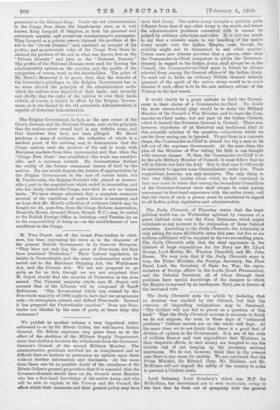It would clearly be a great mistake to limit the
Govern- ment in their choice of a. Commander-in-Chief. No doubt the most symmetrical plan would be to make the Military Member of the Council a War Minister, and to leave the Com. mender-in-Chief under, but not part of, the Indian Cabinet, which is termed the Governor-General in Council. There are, however, objections of an historical and traditional kind to this scientific) solution of the question,—objections which we are far from saying can be ignored. To put them in a concrete shape, the Commander-in-Chief is almost too big a man to be left out of the supreme Government. At the same time, the plan of the Minister of War taking the field is one fraught with extreme danger. If, then, the Commander-in-Chief is to be the sole Military Member of Council, it must follow that he will in future not take the field. But in that case it will surely be necessary to appoint some Generalissimo under him. These suggestions, however, are only tentative. The only thing in this very difficult matter about which we feel tonvineed is that care must be taken that among the immediate Councillors of the Governor-General there shall always be some person conversant by first-hand experience with the native Army, and that the views of such a person must be considered in regard to all Indian policy, legislative and administrative.









































 Previous page
Previous page